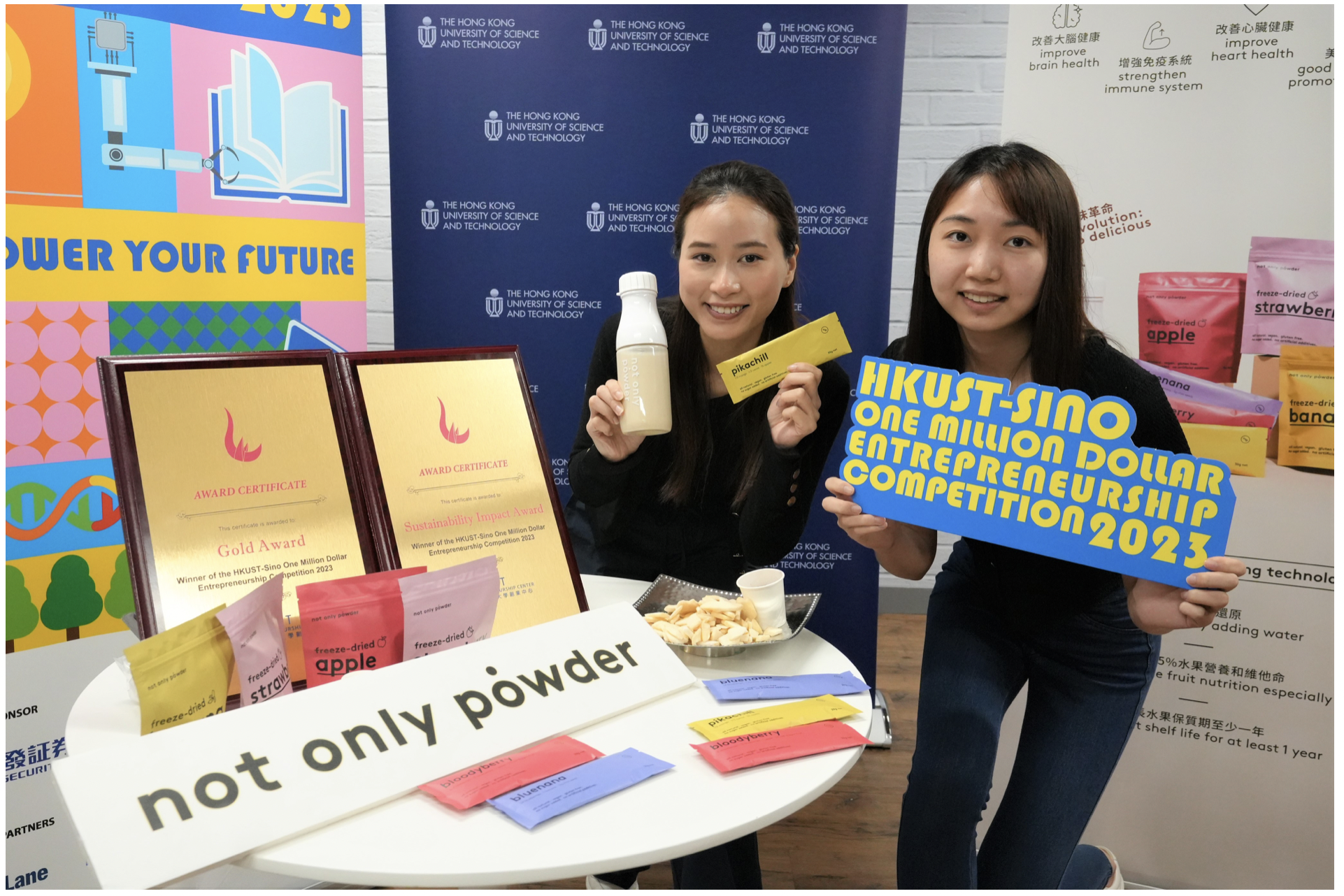Redefining the Potential of Surplus Food

Welcome back to the Innovative Visions Alumni Entrepreneurship Series, where we bring our alumni’s phenomenal entrepreneurship and innovation stories to you. Next in the series is Lilia CHEUNG, BBA in Information Systems and Marketing (2021), Co-founder of Goodtakes and Not Only Powder.
Pandemic Sparks Entrepreneurial Opportunities
Underneath Hong Kong’s splendid foodie scene lies a massive food waste challenge. “The city produces over 3,000 tonnes of surplus food every day,” Lilia tells us. “That’s why I’m focusing both of my businesses on solving food waste issues.”
With a UX design background, Lilia co-founded Goodtakes, a digital platform for F&B outlets to sell and manage their surplus food, and Not Only Powder (NOP), a B2C sustainability brand that repurposes imperfect fruit. Lilia’s entrepreneurship journey can be traced back to her student days at HKUST when her exchange programs were cancelled during COVID-19. Instead, she redirected her energy towards developing her entrepreneurial ideas. Keep reading to discover Lilia’s recipe for entrepreneurial and sustainability success.
Honing Versatile Skills
As a marketing and information systems student, Lilia envisioned a future centered on entrepreneurship. Driven by her innovative spirit, she developed versatile tech and product development skills that now benefit both businesses. “Versatility is crucial for co-founders because our roles involve a wide range of responsibilities,” Lilia explained.
Beyond the classroom, HKUST’s internship opportunities also provided crucial real-world experiences through the University’s career center. “My classmates’ proactiveness motivated me to apply for internships,” she explained. “The experience has helped me better understand the real business dynamics as an entrepreneur.”
Testing Business Ideas
Validating business ideas is a crucial process for entrepreneurs. While developing GoodTtakes after graduation, Lilia sought input from Professor LEE Dongwon – who had been one of her IS professors – in evaluating her idea for the platform. “I’m grateful to Professor Lee for his generous guidance and advice,” she said. “His feedback has given us a significant boost in confidence.”
Additionally, Lilia also further developed her ideas through hackUST in 2022. The following year, NOP won the Sustainability Impact Award at the HKUST-Sino One Million Dollar Entrepreneurship Competition. Yet beyond winning accolades, these competitions also elevated Lilia as an entrepreneur, opening doors to other incubation programs and events. “Many of these competitions at HKUST are accessible to students and recent graduates,” she notes. “It’s a great way to expand your network and connect with other like-minded entrepreneurs and mentors!”
 |
Left: Not Only Powder received the Gold Award of the HKUST-Sino One Million Dollar Entrepreneurship Competition 2023.
Right: Lilia (third from right) was a committee member of the Economics Students' Society, HKUSTSU and cherished the fruitful experience gained beyond classroom.
Understanding Market Needs
Like many budding entrepreneurs, Lilia has tasted the sweet and bitter sides of entrepreneurship. When NOP launched its flagship fruit smoothie powders, her team grappled with soaring production costs and tepid customer feedback. “It was a challenging time,” she admits. “But we chose to pivot and adapt our initial idea by empathizing with our customers’ needs and desires,” she explained.
This shift led to a new partnership with a local manufacturer to craft fruit crisps from surplus imperfect fruit. The crisps resonated better with NOP’s customers and became a bestseller. “Rather than fixating on a single idea, it’s vital for startups to remain flexible and adventurous,” Lilia said.
The Future of Surplus Food
For Lilia, starting a new business is an inherent collaboration. Balancing her roles as co-founder for two businesses, she believes that skillfully managing all parties and their talents is crucial for product impact and success, whether it’s testing prototypes with end users or cultivating new partnerships with stakeholders and vendors.
Looking ahead, the sustainability landscape in Asia is rapidly evolving. Lilia aims to ride this wave of change to expand both businesses beyond Hong Kong. “Surplus food isn’t waste at all if you look at it from both business and sustainability perspectives. That’s something we want consumers to understand and realize the potential of upcycling surplus food.”






